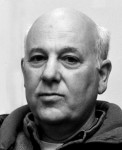
Given that Gordon’s work is profoundly disturbing, in a manner and to a degree that invites even seasoned readers (and fellow writers) to over-identify its speaker(s) with its author, and given that Gordon has, over the last two decades, firmly positioned himself outside of any known school of poetics, never mind any organized network of writers … and given that Gordon’s book is in many ways new territory for Tarpaulin Sky Press, I thought an interview with Gordon might be in order. Rather than conducting the interview myself—which, as his publisher, would have felt awkward if not incestuous—I decided that Gordon, his work, and his readers would be better served by a more open Q & A format. I asked five people, all writers themselves, to ask Gordon some questions about The Essential Numbers, and that’s all the direction I gave.
Interviewers included Ana Bozicevic, Blake Butler, Elena Georgiou, Amy King, and Selah Saterstrom.
Here’s a sample:
BLAKE BUTLER: Do you feel a different person inside your text than you are in your body? Is the writing a focusing of another person, or a removal, or some kind of smudge therein? Or is it something else entirely?
GORDON MASSMAN: I believe the great nerve-work and fiery forge within each one of us almost godly in its omniscience and powers of perception. I believe you, Blake Butler, are murderer, industrialist, mendicant, spiritualist, rapist, whore, misogynist, and lover. I believe you are all human permutations from Hitler to Gandhi. When a man is nailed to a tree for his sexuality or ethnicity, I believe you are both the nailer and the appalled. You both refuse slavery and smoke crack alone in dingy rooms. You are God and The Devil.
I throw as best I can, as believably as I can, the billion colors of human existence through the prism of myself. Over long and intense personal interior struggles I have unearthed my otherwise unspeakable capabilities and visceral dark emotions: rage’s boiling mud, shame’s hot cauldron, the alligators of self-loathing. Not only am I a beautiful child, I am a hideous monster.
Like us all.
Therefore, the person in my body and the person in my text are one in the same. He is me, and I am flinging from my deepest core—making visible—what is universal, I believe, in every male human being. I want my work to spark if not an already conscious embracing, then some subterranean dreamlike ghostly recognition of who you, my reader, are. I want to insist that my sometimes disturbing visions are more or less within everyone, with slight variations. Hasn’t every father fantasized infanticide? Doesn’t every husband want to binge on lovers. Doesn’t murder and suicide lurk in every man?
Like the majority of people, I live a pacifist’s life; I am gentle, tender, soft-spoken, kind. I am generally a courteous and decent citizen. That person, too, resides in my text and body alike; indeed, were he not there to mediate—if he were not infinitely stronger—I would probably not be an intellectualizing writer harmlessly throwing out human colors, but a bona fide miscreant and soul ripper.
ANA BOŽIČEVIĆ & AMY KING: Why don’t you just fucking calm down?
GORDON MASSMAN: Don’t think there’s a why here. When the fire burns up all the wood, it will die. I guess there’s still wood.
(I am calm on the outside.)
ANA BOŽIČEVIĆ & AMY KING: (How) do you think life translates into poetry? How much is it a question of translation and how much of transmutation/alchemy? Does the voice in this book suffer because he is not an alchemist?
GORDON MASSMAN: Lead into gold, transmuting sinful human into perfect being, creating the panacea. No, I have not done that. I go into my gut and amygdala (base instincts, drives, motivations, urges, fantasies, reptilian capabilities). There once existed alchemists, the finest in the land, who perfected the art and against whom present-day alchemist-hopefuls can only be derivative. I speak of Keats, Shelly, Byron, Rumi, Blake, Wordsworth, Dante, etc. My voice certainly would suffer were I to try to emulate these alchemist/masters. They had their pre-Freudian day of courtesies, formalities, corsets, class punctilio, platitudes, meticulousness, generalities, and narcissism. We have our post-Freudian-Einsteinian day of nihilism, nuclear fission, hedonism, birth control patch, gluttony, environmental destruction, and postmodernism. I write for my day and do not suffer that I, or my persona, is not an alchemist. Once it was transmutation, now its translation.
See also: The Essential Numbers | all posts tagged Gordon Massman